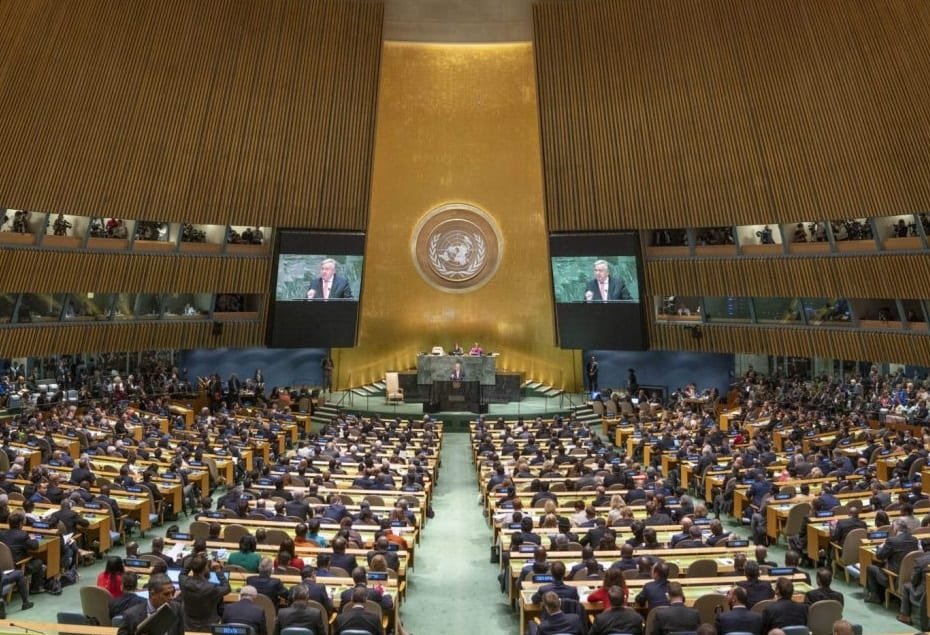The 75th UNGA is a moment for the world to focus on realising the full potential of the United Nations' founding principle of "achieving international cooperation in solving international problems," writes José Luis Castro for Devex.
The once-celebratory undertone of the United Nations’ 75th anniversary General Assembly has been overshadowed by COVID-19. The coronavirus is now driving both the event’s content and format, and for the first time in its history, the UNGA will be virtual.
Under the theme of “The Future We Want, the United Nations We Need: Reaffirming Our Collective Commitment to Multilateralism,” UNGA this year is set against a pandemic that has the potential to turn the task of achieving the Sustainable Developments Goals from very challenging to nearly impossible.
The president of the 74th session of the UNGA, Tijjani Muhammad-Bande, cautioned that the “decade of action” for the SDGs has become the “decade of recovery,” with countries being asked to merely include SDGs in national strategies for COVID-19 recovery, rather than make them the priority.
Today, the U.N. faces some of its most crucial challenges in a world increasingly unsure about the future. As leaders gather for this annual meeting, they must seek to overcome this apprehension and foster cooperation among countries, U.N. agencies, civil society, and the private sector. Unfortunately, the two most powerful member states — China and the U.S. — remain at odds over various issues, including the handling of the virus and support for the World Health Organization.
Here are some areas we are watching as UNGA begins:
1. Will inequity, nationalism, and public doubt mar the potential of a global vaccine?
In a move that could undercut efforts to ensure that the hardest-hit and priority populations receive vaccines quickly, the U.S., Switzerland, Britain, and a few other high-income countries are preordering millions of doses. “Vaccine nationalism” could make vaccine access harder for people in low- and middle-income countries.
To encourage distribution equity, WHO has launched the Access to COVID-19 Tools Accelerator platform for COVID-19 testing, treatment, and vaccine distribution. COVAX, a part of the ACT Accelerator, pools funding from wealthy countries and nonprofits to develop and distribute COVID-19 vaccines. COVAX seeks to deliver nearly 2 billion doses of an effective vaccine to 172 countries that have shown interest by the end of 2021.
Still another problem remains. In 2019, even before the pandemic gripped the globe, WHO identified vaccine hesitancy, or reluctance among the public to be vaccinated, as one of the 10 leading threats to global health. In the past, this reluctance has resulted in the resurgence of measles and other diseases that were nearly eradicated.
Clearly the U.N. has its work cut out. We must realize that we are only as safe as the least vaccinated country in the world.
2. Will the virtual format stifle debate?
The so-called silence procedure will also be in place this year. Draft decisions will be circulated to all member states with a 72-hour window, and if no objections are raised, the draft decisions are considered adopted.
Ironically, U.S. President Donald Trump, who has been among the United Nations’ most vocal critics, will be the only world leader speaking live this year.
3. How can member states refocus on hunger and development?
At UNGA, malnutrition and obesity are already on the agenda, owing in part to the U.N. “decade of action on nutrition,” whose ambition is “to eradicate malnutrition in all its forms” by 2025.
However, with the COVID-19 pandemic exacerbating shortcomings in food systems, member states may feel additional urgency to shore up food security. “The State of Food Security and Nutrition in the World 2020” forecasts that the pandemic could push an additional 132 million people into undernourishment by the end of 2020.
Adding to the complexity, a recent research study indicates that obesity significantly increases the risk of death due to COVID-19 by 48% and may make vaccines less effective.
At the same time, markets remain flooded with affordable but nutrient-deficient food that is ultraprocessed and high in sodium, sugar, and trans fats — foods that satiate but also can lead to obesity and contribute to the enormous burden of diabetes, heart disease, and cancer across much of the world.
Member states may look to peers for inspiration. For instance, Mexican states have banned the marketing of highly processed foods and sugary drinks to children.
Other countries in Latin America have taken policy measures to improve nutrition, such as Chile’s front-of-package labels that reduced consumption of sugary beverages by roughly 25%. To address the need for healthier food policy, a high-level virtual event will review some of the most effective and promising food policies, including front-of-package labeling initiatives.
COVID-19 has further exposed weaknesses in national public health and social systems, and poor global cooperation may have contributed to its toll by failing to empower nations from responding quickly and capably. This 75th UNGA is a moment for the world to focus on realizing the full potential of the United Nations’ founding principle of “achieving international cooperation in solving international problems.” This cooperation will be essential to reimagining public health as more central to our civic and social systems.
Together, we can build a world where everyone is protected by a strong public health system — one that responds to the needs of today but also is prepared for the next crisis that influences public health, whether another pandemic, the burgeoning effect of noncommunicable diseases, the impact of climate change, or something yet unseen.
José Luis Castro is president and CEO of Vital Strategies, a global public health organization that designs solutions to pressing health problems.
Original source: Devex
Image credit: United States Council for International Business

